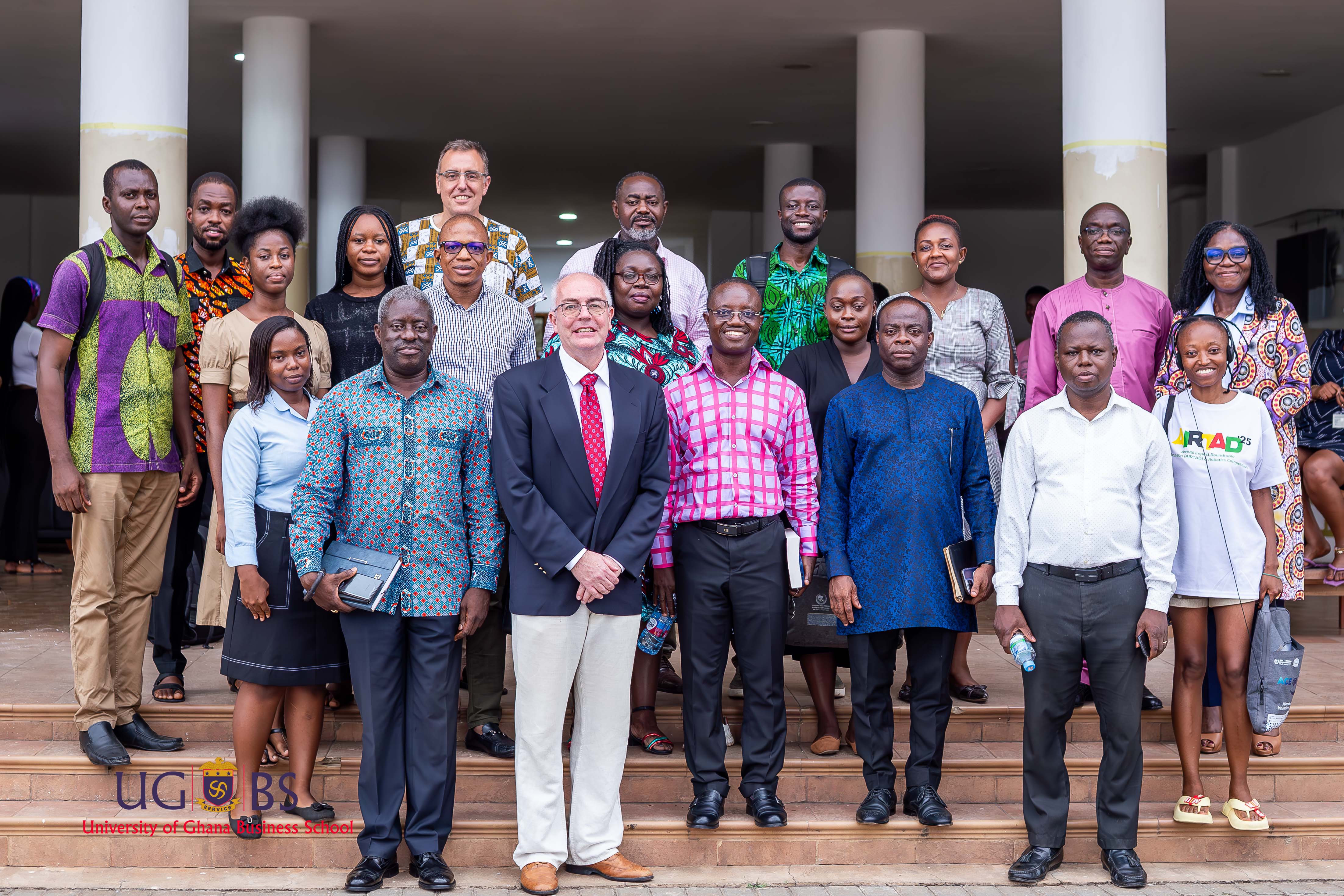
UGBS Department of Public Administration and Health Service Management Engages MacEachen Institute on Pandemic Risk Governance
On 29th April 2025, the Public Administration and Health Service Management Department of the University of Ghana Business School engaged MacEachen Institute for Public Policy and Governance to deliver a presentation at the Graduate School on Risk Governance and Uncertainty: Lessons from Canada’s Pandemic Response.
Dr. Kevin Quiley, Scholarly Director, MacEachen Institute for Public Policy and Governance, stated that the pandemic significantly impacted Canadian society, with over 3.7 million reported COVID-19 cases and 37,000 deaths. He stressed that COVID-19 revealed the strengths and weaknesses of Canada’s systems, from health care and employment to housing and communication. Dr. Quiley explained that in the early stages, Intensive Care Unit (ICU) capacity became a major concern, as projections showed Canada might need up to thirteen times more ICU beds than were available. He added that staff retirements due to exhaustion and stress overwhelmed hospitals. This fear drove urgent public health measures.

Dr. Quiley also explored the “risk regulation regime” framework by scholars Christopher Hood, Henry Rothstein, and Robert Baldwin to understand Canada's pandemic risk management through standards, monitoring, and response systems. He stated that Canada’s tourism sector, which employs about 10% of the population, came to a near halt. This hit vulnerable workers the hardest, many of whom had jobs without benefits or security. Unemployment spiked from 5% to between 30% and 50%.
Dr. Quigley stressed that Canada's emergency response lacked coordination and adequate Personal Protective Equipment stockpiles, especially in the early stages. He added that public messaging about mask use was inconsistent, initially suggesting masks could be harmful due to misuse, partly to conserve supplies. This confusion showed the challenge of communicating under uncertainty while learning in real time.
Dr. Quigley explained that Canada’s emergency response also showed how divided responsibilities were among its 13 provincial and federal governments. He noted that the crisis shifted the focus from emergency management to public health. He revealed that Canada's use of COVAX vaccines meant for poorer countries highlighted global inequalities and raised moral questions about fairness in crisis. Dr. Quigley pointed out that Canada’s health care system, while 70% publicly funded, reignited debates over funding and privatization.
In contrast, Prof. Gordon Abekah-Nkrumah, Department of Public Administration and Health Services Management, noted that Ghana heavily relied on private sector support for health care services. He explained that without private sector involvement, Ghana’s pandemic response might have failed. Prof. Abekah-Nkrumah recommended that the government strengthen public-private partnerships not just during emergencies but for daily healthcare delivery.

During the crisis, Canadians turned to traditional media for trusted updates, and online news traffic rose by 19% in 2020. Although the media informed the public and gave voice to communities, it sometimes exaggerated stories, ignored real risks, and unfairly blamed youth for spreading the virus.
Dr. Quigley discussed three kinds of risk that governments faced: complex risks involving many unknowns and requiring trust in science, uncertain risks where future outcomes were unpredictable, and ambiguous risks where data existed but interpretations differed, creating conflict over decisions and public policy. He shared that the major challenge was the difference in how people understood the risk. Dr. Quigley noted that for some, COVID was a health threat; for others, an economic problem. This showed how difficult it was to build a shared understanding and make decisions in a crisis.
He also mentioned that not only were healthcare workers at risk, but so were lower-paid service workers in warehouses and other essential services. Dr. Quigley emphasised that these groups often lacked adequate protection and became hotspots for outbreaks, highlighting systemic inequities. According to Dr. Quigley, trust, effective communication, and organized political power matter deeply. ‘When the next pandemic comes, we’ll need to be better prepared to listen, lead, and support everyone, not just the loudest or wealthiest,’ he noted.